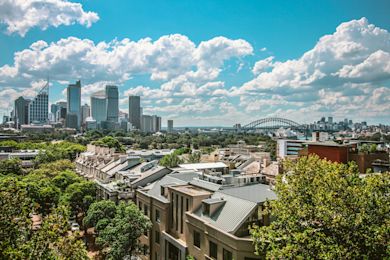- News and articles
- Events
- Find usIDP AustraliaIDP BahrainIDP BangladeshIDP CambodiaIDP CanadaIDP ChinaIDP EgyptIDP GhanaIDP Hong KongIDP IndiaIDP IranIDP JordanIDP KenyaIDP KoreaIDP KuwaitIDP LebanonIDP MalaysiaIDP MauritiusIDP Middle EastIDP NepalIDP New ZealandIDP NigeriaIDP OmanIDP PakistanIDP PhilippinesIDP Saudi ArabiaIDP SingaporeIDP Sri LankaIDP Taiwan, ChinaIDP ThailandIDP TurkeyIDP UAEIDP VietnamIDP Corporate
- Social
- English
Topics covered
- Published: 19 September 2024
- Updated: 5 October 2024
Universities today are changing the way they teach. Many are moving away from traditional lectures and adopting a new approach called experiential learning. Put simply, this means students learn from practical lessons, and not just by listening. They might build something, work on a team project, or solve a real problem.
This way of learning is more interesting and helps students remember and understand subjects better. After graduating from university, students who have gone through experiential learning will be better equipped to apply their skills and knowledge in their careers and in life.
What is experiential learning?
The meaning behind experiential learning is “learn by doing”. It is a key concept in higher education that involves students actively engaging in activities and applying their classroom knowledge to real-world scenarios.
As they do these activities, students will engage in critical thinking, reflect on their actions and learn from these experiences. This helps students connect classroom lessons to the real world, making learning more relevant.
The theory behind experiential learning
David Kolb, the creator of the experiential learning theory, describes learning as a process with four stages. These stages help us understand how we learn from experiences.
Concrete Experience: This is the first step where learners get involved in a new activity. It could be anything from a practical task to a new type of project. In this stage, doing and being part of the activity is key.
Reflective Observation: After the activity, learners think about what they did. They look back on the experience and ask questions like, "What happened?" and "How did it go?" This stage is about thinking over the activity and understanding it better.
Abstract Conceptualisation: Now, learners start making sense of what they did. They connect their new experience with what they already know. This might mean changing old ideas or coming up with new ones based on experience.
Active Experimentation: The last stage is about putting new ideas into action. Learners try out their new understanding in different situations. It's like testing their ideas to see how they work in the real world.
Kolb's theory shows us that experiential learning is a cycle. You go through these stages, one after the other, and each one depends on the one before it. The theory also says that people might prefer some stages over others. This idea has led to the discovery of different learning styles, showing that learning is a full and ongoing process.
Experiential learning in practice
Experiential learning is a lively way of learning that’s changing education inside and outside of classrooms. Educators are using new, exciting ways to teach that give students a wide range of experiences that make their learning richer and more interesting.
Classroom innovations
Imagine walking into a business class at a university, where instead of a traditional lecture, you find groups of students engaged in a lively simulation of a corporate negotiation. This is an example of how universities are adapting experiential learning into their lessons. In such simulations, students step into the roles of business leaders, making decisions and facing real-world business challenges.
Similarly, in a science lab, rather than just reading about chemical reactions, students actively conduct experiments, mixing chemicals and observing reactions first-hand. These interactive experiences, including case studies and lab work, not only make learning more engaging but also deepen students’ understanding of the subject matter.
Beyond the classroom
Beyond the confines of the classroom, experiential learning extends to areas like internships and fieldwork.
For example, business students might intern at a corporate firm, getting hands-on experience with market analysis or project management. This way, they’re actively participating in the business practices they’re learning about, applying their academic knowledge in a professional setting. This immersion in a real-world work environment is invaluable for providing insights into professional life and enhancing employability.
For fieldwork, consider architecture students visiting a construction site. They witness the actual construction of a building, understanding how their theoretical knowledge translates into physical structures. This kind of fieldwork offers them a practical perspective of their studies, enhancing their comprehension and design skills.
Similarly, biology students might engage in fieldwork in a forest, observing natural ecosystems firsthand. This direct interaction with the environment deepens their understanding of ecological concepts while honing their observational and research skills.
Each of these experiences, internships and fieldwork, enriches students’ higher education, equipping them with practical skills and a broader perspective that extends far beyond the traditional classroom environment.
Benefits of experiential learning
Better learning outcomes
Experiential learning leads to more motivated and engaged students with a deeper understanding of the subject and better retention of knowledge.
It's similar to learning how to ride a bike–you’ll learn faster doing it than reading about it. For example, in a science class, students who perform experiments themselves grasp the concepts more effectively than those who only read about them. This active participation makes learning engaging and helps them remember the information.
Preparing graduates for future careers
By participating in internships and real-world projects, students not only develop practical skills but also their professional identity. Experiential learning exposes students to real-world work situations so they leave school with a realistic understanding of workplace roles and responsibilities.
Students who go through experiential learning in university graduate as adaptable individuals able to adapt to diverse professional challenges effectively. Moreover, certain activities like internships offer valuable networking opportunities that can potentially lead to future job prospects.
Challenges and considerations of experiential learning
While there are many benefits to the experiential learning approach, universities may encounter challenges when adding it to their curriculums.
Implementing experiential learning
A big challenge to implementing the experiential learning approach is how much it costs. This style of learning typically needs more things than normal classes. This includes special tools for labs or transportation costs to visit locations for fieldwork. The university also has to ensure that the experiential learning lesson plan is aligned with educational goals and standards, which can cost time and resources to be approved.
Balancing theory and practice
Another challenge is striking the balance between theory and practice. Too much focus on theory can leave students unprepared for the practical aspects of their field. They might understand concepts well, but without real-world application, they may struggle to apply this knowledge effectively in real situations. On the other hand, emphasising practice too heavily can lead to a lack of deep understanding. Students might know how to perform certain tasks, but without a solid theoretical foundation, they may not fully grasp the 'why' behind their actions.
Experiential learning success stories
There are many great examples of universities adopting experiential learning into their curriculum to create more enriching higher education experiences for their students. These are just two examples out of many.
STEMSEAS Program at Columbia University
This programme is a collaboration between Columbia University and Lamont-Doherty Earth Observatory. It involves students travelling on scientific ships and learning about oceanography and geosciences. Over 200 students have joined these expeditions since 2016, gaining real-world experience and career confidence. The program has helped students see what working in science is really like and decide on their future careers.
University of Edinburgh's Fieldwork in GeoSciences
In the field of GeoSciences at this Scottish university, experiential learning is implemented through fieldwork by getting students to create an artefact to share their research projects. Students were tasked to produce media like podcasts, short films and comic strips that challenged them to think critically about how they share research as well as improve their questioning, listening, observing, documenting, analysing and writing skills.
The future of experiential learning
The future of experiential learning in higher education looks bright and full of possibilities. With technology advancing every day, this learning approach is set to become even more interactive and immersive. Virtual reality (VR) and augmented reality (AR) technology could help universities solve the challenges of limited resources for experiential learning programmes by taking students on virtual field trips to distant lands or historical events.
Find your ideal university for experiential learning with IDP
Experiential learning makes learning more interesting, helps students understand and remember what they’re taught, and prepares them for real-life challenges. It is an approach that equips students with practical skills, making them more employable and ready for their future careers.
If you’re exploring universities that excel in experiential learning, IDP can help. We specialise in helping students study abroad with our overseas education placement services. IDP connects learners with some of the best schools in the world university rankings to meet their educational aspirations. With IDP, you can choose a university that teaches you through real-world experiences for the best job prospects in the future.
Ready to start? Book your free counselling session with IDP today. Our consultants will help you find the best university for you. Alternatively, hit the message button to drop us a question. Start your journey to a great education with IDP and prepare for your future.
One account for all your study abroad needs
Create your profile and unlock a wide array of features including personalised recommendations, fast-tracked applications and much more.
Search for articles
Dive into our extensive collection of articles by using our comprehensive topic search tool.















